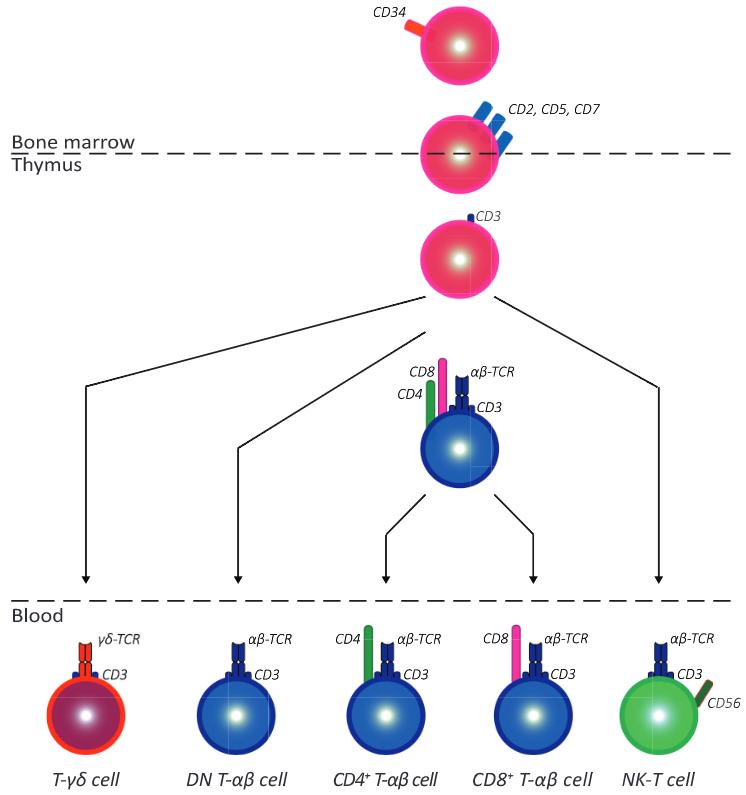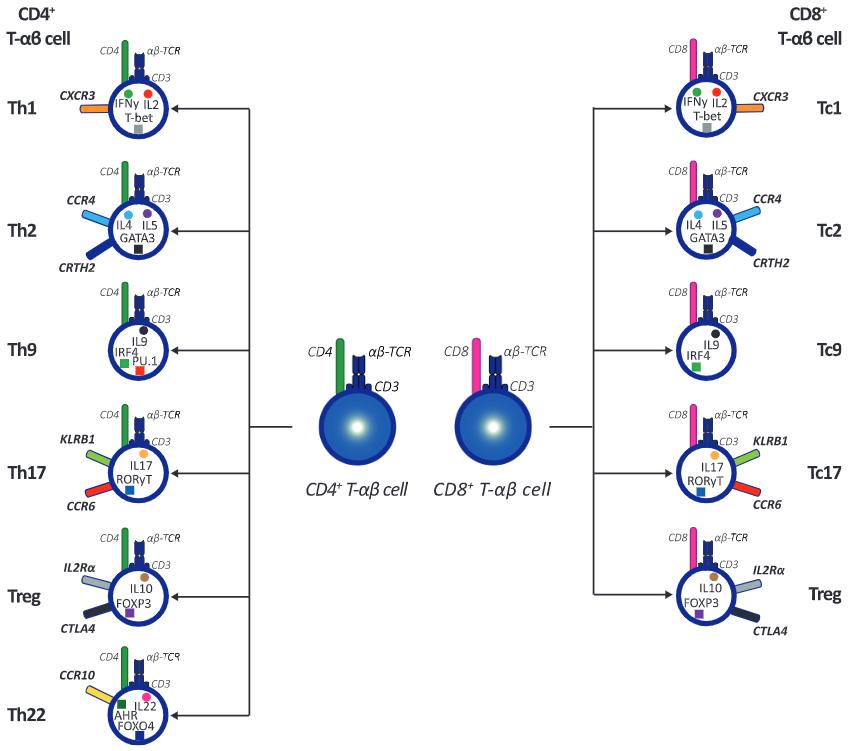Immunomics Services
Immunomics Services for T Cells
T cells, also called T lymphocytes and thymocytes, are an important part of the immune system, developing from stem cells in the bone marrow, and they help protect the body from infection and may help fight cancer. CD Genomics offers immunomics services for T cells to help our clients decipher the immune response process.
Introduction to T Cells
T cells originate from lymphoid progenitor cells with the ability to transport from bone marrow to the thymus. T cell development here includes T cell receptor (TCR)-mediated selection and maturation into naïve T cells. Lymphangiogenesis begins with progenitor cells expressing CD2, CD5, CD7, and cytoplasmic CD3, which have the capacity to enter the thymic cortex. At this point, TCRs form after rearrangement of the α, β, γ, and δ chains to form T cells with γδ chains (T-γδ) and T cells with αβ chains (T-αβ).
 Fig.1 Discriminating T cells from their relatives. (Mousset, C. M., et al., 2019)
Fig.1 Discriminating T cells from their relatives. (Mousset, C. M., et al., 2019)
Types of T Cells
Interacting with the MHC class I complex leads to a single expression or peptide of CD8, while the complex with MHC class II leads to a single expression of CD4. T-αβ then migrates from the thymic cortex to the medulla for negative clonal selection to remove T cells with high affinity for self-antigens. Finally, mature single-positive CD4+ and CD8+ T-αβ cells are released into the bloodstream. A small fraction (approximately 1%) of peripheral blood T-αβ cells do not express CD4 or CD8 and are referred to as double-negative (DN) T-αβ cells.
 Fig.2 Identification of CD4+ and CD8+ T-αβ subsets. (Mousset, C. M., et al., 2019)
Fig.2 Identification of CD4+ and CD8+ T-αβ subsets. (Mousset, C. M., et al., 2019)
Applications of T Cell Immunomics
The immune pool present in the T-cell receptor (TCR) varies greatly among individuals. Sequencing the TCR pool facilitates the understanding immune response process to disease and helps to maintain the benign of the disease.
- T Cell Immunomics Study of JIA Patients
The diverse disease mechanisms in patients with juvenile idiopathic arthritis (JIA) make it difficult for clinical studies to confidently predict responses and match patients to currently available treatment modalities. Circulating pathogenic-like lymphocytes (CPL) are a subset of circulating CD4 T-effector (Teff) cells, and the TCR pool of CPL is highly enriched in synovial clonotypes and is significantly increased in patients with active JIA resistant to methotrexate (MTX) and anti-TNF-α therapies.
Our Services
T-cell compartments form a strong defense against external pathogens and internal malignant cells. At the same time, specific subpopulations of T cells control this process, keeping the immune system under control and preventing autoimmunity. CD Genomics offers several types of immunomics services to help clients perform comprehensive phenotyping of T-cell subsets of interest.
- TCR Repertoire Analysis Services - Analysis of the TCR contributes to a better understanding of the characteristics of the immune system and the etiology and progression of diseases.
- Epigenomics Analysis for T Cells - CD Genomics provides epigenomics services for T cells to help clients understand the epigenetic processes that dynamically regulate gene expression.
- Transcriptomics Analysis for T Cells - Our company provides transcriptomics services of T cells for the study of immune processes related to health maintenance and disease pathogenesis.
- T-Cell Protein Profiling by CyTOF - We offer single-cell proteomics services for T cells to help clients understand their surface characteristics and the signaling pathways that regulate these characteristics.
CD Genomics is focused on helping clients explore T cell classes of interest and their unique role in the immune process. Our immunomics services will help you address bottlenecks in your project and provide you with the key insights needed to advance your research. Please contact us for more information.
Reference
- Mousset, C. M., Hobo, W., Woestenenk, R., Preijers, F., Dolstra, H., & van der Waart, A. B. (2019). Comprehensive phenotyping of T cells using flow cytometry. Cytometry Part A, 95(6), 647-654.
